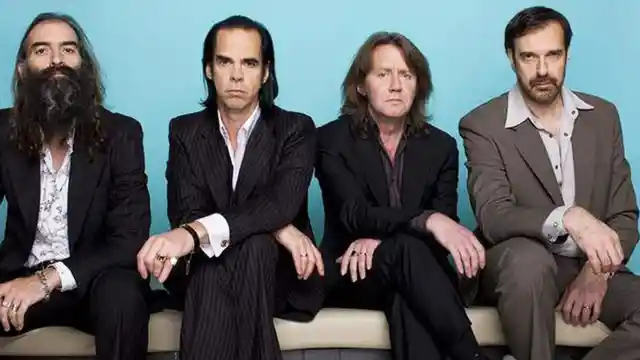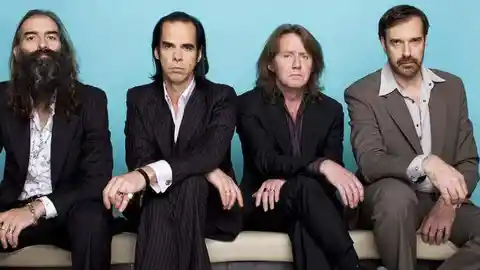

Gestating as Australia’s pre-eminent art-rock band in the 80s, Nick Cave and the Bad Seeds have grown to become one of the most internationally heralded music outfits in the world. Having recently viewed the Nick Cave bio-film, 20,000 Days on Earth, I took it upon myself to go through his discography and make an estimation for his ten best albums. It wasn’t an easy task, especially as the Bad Seeds are acclaimed for being so consistent, but it’s hard to argue that these ten albums don’t represent the band’s essence best.
Number Ten: The Good Son (1990). One of the first albums in Nick Cave’s catalog to be generally calm, many fans were at first a bit dismayed that the album took a turn away from the loud and abrasive post-punk that propelled his earlier work. In retrospect though, we can see The Good Son as the first album that would propel his more mature-minded work, and it also features at least two of his best songs (The Weeping Song and The Ship Song). A bit slight around the edges to rank as one of his very overall best, but certainly one of his most important towards evolving his craft.
Number Nine: Dig!!! Lazarus Dig!!! (2008). After forming The Bad Seeds side project Grinderman, and scoring two film soundtracks with crony Warren Ellis, Nick Cave returned to his Bad Seeds outfit with a real thirst for good ol’ rock and roll. The album has a real blues-esque disposition to it, after his recent excursions into more Baroque territory. Still, it carries the Aussie’s trademark sense of black humor, particularly on the title track which re-envisions the biblical Lazarus being resurrected in current times and ending up a junkie and a prison inmate. Leave it to Cave, to make blasphemy so hysterical!
Number Eight: Your Funeral… My Trial (1986). The first album to have The Bad Seeds primarily reduced to a quartet, Your Funeral… My Trial still showed the group as firmly eclectic. The record has plenty of melancholic songs like the title track and “Sad Waters” that definitely show Cave’s dark-yet-endearing side. The most immersive songs, however, are the ones where Cave gets really innovative, such as the 8-minute song “The Carny,” or on the gleefully vile “Scum,” which ranks as one the best insult songs ever made. Sample lyric: “I think you f***ing traitor, chronic masturbator/ Shitlicker, user, self-abuser, jigger jigger!”
Number Seven: Murder Ballads (1996). While Nick Cave had blossomed his career off of making songs about gruesome murders and sacrilegious violence, it wasn’t until 1996 that he made an album that was solely composed of those songs. Ironically, Cave says the album was a response towards him getting bored about writing “murder ballads,” but the songs still show a fiery passion to them that complement the subject matter. From his duet with then-lover PJ Harvey, “Henry Lee,” to his brutal cover of “Stagger Lee,” it’s a powerful record despite what your affinity to the subject matter might be. Also, it has at least one song on it that will make you feel a bit more…evil.
Number Six: Tender Prey (1988). If you listen to Nick Cave primarily for a raw sound, and songs that spurt titillating violent imagery, than it’s a safe bet that this is your preferred album of his. Here, Nick Cave’s biblical references and crime-fiction narratives sound especially potent, and it’s arguably the first Bad Seeds album that found how to make the piano and string notes so menacing. It’s intro track, “The Mercy Seat,” has been a highlight in his discography for over two decades now, and the fact that it’s on this album alone, guarantees Tender Prey a spot on this list.
Number Five: Push the Sky Away (2013). Cave’s most recent album, released while he was age 55, is as curious and mesmerizing an entry in his catalog as any other. Explaining that the album gestated through a period of extensive “web-research,” Nick Cave refers to such modern fixtures like Wikipedia, Miley Cyrus and Hannah Montana. The inclusion of such material might befuddle longtime Nick Cave fans, yet this is all so integral for his character. Cave has always been admirable for how ageless his aura is, and despite his increased age, he’s able to give his spin on popular matters in the world right now. As for the music, Push the Sky Away is all aces too, with an album sound that is foreboding, somber, and elegiac in stunning ways. It’s always so satisfying to see an artist so revered drop a 15th album that is this surprising.
Number Four: Abattoir Blues/The Lyre of Orpheus (2004). A massive double-album that’s virtually devoid of filler is a minor miracle in itself, but that it contains some of the band’s best work is something more. Half a rock album, and the other half a more elegantly symphonic offering, both sides of the Bad Seed brain are on display here, and while it might not exactly be groundbreaking, it’s confident and pleasing enough to rank among their most elite offerings. Also consider this: the album’s closing track “O Children” happened to be featured in the most touching scene in the entire Harry Potter movies series!
Number Three: From Her To Eternity (1984). The debut Bad Seeds album is a neo-goth classic. Starting off with the appropriately titled “Avalanche,” the album immediately brings listeners into the claustrophobic and manic world of The Bad Seeds, one that Nick Cave would describe as “God actually exists.” It’s deliciously demented (not unlike Cave’s previous outfit The Birthday Party) but songs like the title track and his cover of “In the Ghetto” suggest that Cave is a man who seeks peace through all this chaos. As glorious a listening experience as ever, even 31 years after its release.
Number Two: No More Shall We Part (2001). If there is one Cave album I wouldn’t hesitate to call beautiful, it would be this one. A towering record that’s carried more by piano than any of his other albums, No More Shall We Part sees Cave concocting a true tapestry of grief and longing. With his signature themes about love, loss and religion still upfront, No More Shall We Part is definitely a Cave record, it’s just done with a heightened sense of artistry. Coming after a 4-year gap where Cave battled heroin addiction, it’s fully feasible why he put so much passion into this project, and equally feasible why he hasn’t put out another album this masterful since.
Number One: The Boatman’s Call (1997). When a Nick Cave album opens with the line “I don’t believe in an interventionist God,” then you know that this is some real personal stuff. Nick Cave has referred to his fixation about the biblical throughout his lengthy career, but finally admitting to not believing in the God of scripture perfectly sets up The Boatman’s Call thematically. Comprised entirely of love songs, and with hardly any mention of violence, the album sees Nick Cave fully as a tortured-lover, and it’s the ideal mid-way segueway point for his career. Not nearly as grandiose as his latter works, and far more subdued than any of his “punk” albums, it’s easily his most minimalist work, and at times it even feels like he might have asked Mark Hollis to ghostwrite it for him. Still, for these reasons it’s the signature Nick Cave album, as it’s just necessary for a man of so many faces to put out just one release where he bears all naked, vulnerable and sympathetic.